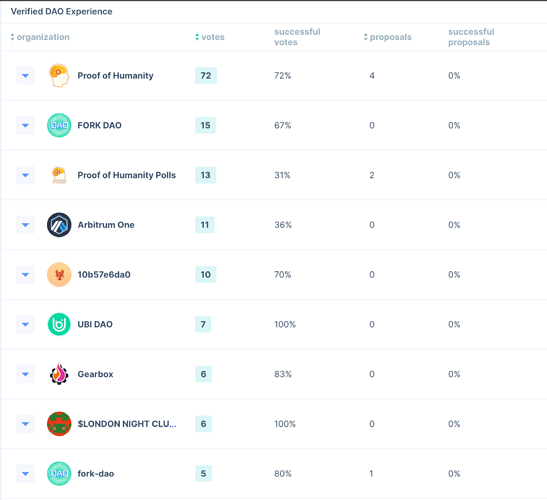Summary
Dealing with voter fatigue and finding the right onboarding incentives are points of struggle for every DAO. The fact that DAOs do not have any information on their non-participating members makes the puzzle harder. DeepDAO believes that it is possible to understand $API3 token holders down to their interest categories and activity patterns to point toward measures to improve voter participation.
We propose conducting a data-based segmentation of $API3 token holders to find out the largest segments of non-voters, voters with decaying participation scores, etc. to point toward the right onboarding steps/incentives for them.
How to address this
Governance activity in different DAOs provides valuable insights into the characteristics and preferences of wallet holders. It serves as a window into their interests, motivations, and potential contributions.
For example, taking a closer look at 0xjean on DeepDAO:
*screenshot is cropped, please visit DeepDAO to view the full profile
we observe a strong inclination towards identity products(from participation in DAOs like Proof of Humanity, Sismo, etc.) and Public Goods (from participation in DAOs like UBI DAO, Gitcoin, etc). This presents an opportunity for some other DAO 0xjean is a member of to leverage this interest by introducing DAO participation badges or some initiative focused on public goods. These tangible incentives can not only recognize and reward active participants but also serve as a magnet for other enthusiasts with similar interests, encouraging their engagement and involvement in the DAO’s decision-making processes.
Similarly, we can identify other categories of mass interest and introduce new initiatives to the DAO. For instance, if there is a substantial segment of members expressing interest in data analysis or research, establishing a dedicated research guild could be a strategic move. Having understood that the 100s of $API3 token holders are looking for gig work, the DAO could open more avenues for contribution for these people.
This proposal aims to create interest and activity-based segmentation of $API3 token holders so that the DAO can find methods to retain and onboard new addresses to API3 DAO’s governance. Armed with this knowledge, API3 DAO can optimize its governance processes, create better onboarding flows, prioritize new initiatives, and foster a more vibrant and engaged community.
Note that we aren’t directly incentivizing governance participation but trying to introduce genuine initiatives that make participation more attractive and more useful to a wider audience.
Methodology
A very high-level plan of action for analyzing the 20k+ $API3 token holders:
- Get the DAO resumes of all $API3 token holders (granular activity & memberships), as aggregated by DeepDAO
- Based on (1): Label each address’s interest (NFTs, DeFi, Investments, Gaming, gig work, etc.) “Interest” is defined as membership or activity in a DAO category over a threshold. Label their activity on API3 DAO (persistent voter, long-term dormant address, non-voter, an address that used to participate, an address that is getting less interested in participating over time, and more.)
- Repeat step 2 with different interest/activity categories to optimize the segmentation. We now have a well-segmented view of $API3 token holders with info on how large each segment is.
- Label bots & vote miners: recent research by DeepDAO identified voting miners’ activity across the DAO ecosystem. We use this data to check for malicious actors.
- Based on DeepDAO’s domain expertise in Web3 and governance, work with API3 DAO to define the right incentives/onboarding steps for each segmented group.
Deliverables
- A report with analysis of all governance participants of API3 DAO and non-active $API3 holders. This will answer questions like who are the primary participants, which are the largest segments of active, and inactive participants, which segments have the highest attrition/retention, etc.
- A CSV file with all $API3 token holders and their category interests, as reflected by the DAOs they vote in.
- Based on (1) & (2), a brainstorming session with API3 DAO to come up with an action plan to onboard inactive segments of voters. One such step could be introducing NFT badges if we discover a large number of people who are interested in NFTs or starting guilds if we discover a segment of users that are looking for gig work.
Milestones
Milestone 1:
DeepDAO dives deeper into $API3 holders and finalizes the optimal labels & interest categories.
Time required: 4 weeks from the start of the project
Milestone 2:
DeepDAO hands over deliverables (1), (2) & (3)
Time required: 2 weeks from Milestone 1 completion
Funding Requested
We request total funding of $15,000 with the following breakdown: 33% ($5,000) after Milestone 1 and the remaining 67% ($10,000) after Milestone 2.
About DeepDAO
DeepDAO is the #1 discovery and analytics engine for the DAO ecosystem. We aggregate, list, and analyze financial and governance data for over 12.5k DAOs and 6.9M governance token holders across different chains and governance platforms. DeepDAO is widely recognized in the ecosystem and media as the go-to source for data about DAOs.
